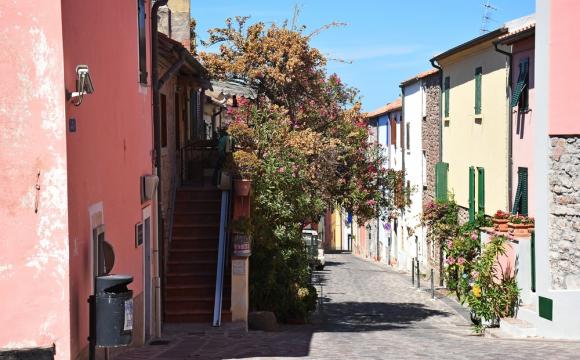For all dog lovers out there who are wondering about regulations and facilities to travel with your dog around Italy, Willemijn of Villa in Umbria gives us some great advice in the following article. Do not miss her tips on how to look for a villa where pets are welcome, her dog owner "to do" list and the specific information for those traveling from the UK or planning to visit Umbria.
We love our pets and though we will never know for sure, I think our trusted friends would rather like to come on our holiday and stay in for example that fantastic villa we rented in Umbria, 'the green heart of Italy', to gnaw on some italian bone instead of spending the best days of summer in the asylum. Bringing your pet to Italy also might save you a nice sum of money on kennel fees.
Not that long ago taking your dog on a holiday was quite a daunting exercise, not in the least because of the mandatory 6 month quarantine. Around 2001 a scheme was introduced which made traveling between countries a lot easier enter PETS, the Pet Travel Scheme.
So what are the rules these days?
The UK government has set strict rules to keep rabies, tick and tapeworm infected dogs out of the country. However if you know at least 7 months in advance you want to take your dog on a holiday here is what you need to do:
1. Your dog(s) will need to be microchipped. This is done by inserting a very small chip just under the skin that contains information about the owner. Don't worry this is a simple procedure and the dog will hardly feel it being placed.
The information on the chip can be read by a special reader. In Italy the vets have such a reader as do the veterinarians of the USL/ASL and most or all of the kennels and dog pounds. The law in Italy states that each dog has to have a microchip and if you find a dog you need to bring it to the offices where they read the chip.
Even if you are not planning to travel abroad it is a good idea to get your dog chipped, it will make it a lot easier to trace the owner of a lost dog.
2. After your dog(s) has been chipped it will need to get a rabies vaccination followed by a blood test to make sure that the vaccine has given sufficient protection against rabies. After the blood test you will need to wait 6 months and you can get packing.
Off course the procedure will need to be documented which is done in a real dog passport.
 Now if you want to return to the UK there is one thing you need to remember.
Now if you want to return to the UK there is one thing you need to remember.
Not less than 24 and no more than 48 hours before you expect to set foot on UK soil again, your dog must be treated against a tapeworms and ticks by a vet. In case you are taking your trip slowly, you should look for a vet in France who can do the treatment. This treatment needs to be documented in the dogs passport.
And that is basically it, so basta with the rules.
If you want more information contact your vet or have a look at the excellent Defra website:
http://ww2.defra.gov.uk/wildlife-pets/pets/travel/
How will I find a nice apartment or villa to stay with my dogs?
There are several websites listing dog-friendly hotels and holiday rentals, but unfortunately not many cover Italy so you will have to refer to google or any other search engine.
If you are planning to travel to lovely Umbria, which is a very nice region to bring your dog to, VillainUmbria.com has a list of private villas where dogs are welcome and also a list with dog friendly holiday apartments.
Some things to keep in mind while you are on the hunt for a dog friendly villa or apartment:
1. find out whether you can bring the dog inside the holiday rental or whether the dog stays outside in a kennel?
2. are there extra expenses for bringing a dog? Often there is extra final cleaning and also the security deposit can go up a bit.
3. is the garden fenced? This may not be needed if your dog is always at your side, you know your dog best.
4. in case the owners live on site as well, do they have pets and could this cause a conflict? Again, you know your dog well so you know whether he/she chases cats and how he/she behaves with other dogs.
5. what are the rules for bringing a pet? Some owners of rentals for instance ask you to never leave the dog alone inside the apartment or to always keep the dog on a leash, see also below for the 'well behaved dog owners list'.
How to be a dog owner that will be welcomed back.
1. always clean up after your dog - both inside as well as outside. Make sure you feed your dog outside and not on terra cotta tiles that can be difficult to clean.
2. make sure your dog is not causing harm or irritation to other guests, some children and even grown ups are afraid of dogs.
3. keep your dog from jumping in the pool.
4. never leave your dog alone if the dog is anxious, the damage a dog can do in an apartment trying to get away or out of frustration can be rather problematic to explain to the owners.
5. do not allow your dog on sofas or beds. The guests who will come after you will not be happy finding dog hairs all over the place.
6. never leave your dog in your car, even with a window a bit open. It gets far too hot inside!
A few words of caution.
In the areas where the expensive white truffle is found, it can happen occasionally that dogs are poisoned The poison is actually meant for a competitor's dog. Do ask the owners of the place you are to rent if they are aware of any cases like this before taking your dog on a walk without a leash. Also be careful in the months of February and March. Hunters might leave poisoned meat out in the hope that it will kill wild dogs, cats and foxes which may otherwise prey on animals they set out which they will shoot later when hunting season reopens.
At all times it is best to only walk with your dog on a leash and make sure he/she does not eat anything from the ground.
Finally ... let's also include a 'to do' for some positive balance:
1. give your dog a collar with your name and your mobile number clearly written on it. The Italian countryside is as inviting for dogs as it is to human beings.
2. make sure your dog has shaded place in summer and always has access to plenty of water.
3. invest in a good flee/tick collar which also protects against sand-fly bite, for instance the Scalibor brand is good.
In Italy some restaurants accept dogs as long as they lie quietly under the table. Most restaurants that have an open air terrace have no problems at all when you bring a dog. Asking if your dog is welcome is always a good idea and something always appreciated. Please do not feed your dog directly from your plate or glass, in Italy it is frowned upon.
Oh and finally attach the leash of the dog to your chair and NOT to the table, especially if your dog tends to chase things like cats, pigeons or other dogs...
That's it quite a list but I guess you'll agree most of it is common sense and there aren't a lot of obstacles bringing your best friend to Italy. Benvenuto in Italia!
Willemijn Lindeboom is the owner/director of the Umbria specialist villainumbria.com and welcomes any questions on renting your dream spot in Umbria with or without dog.













